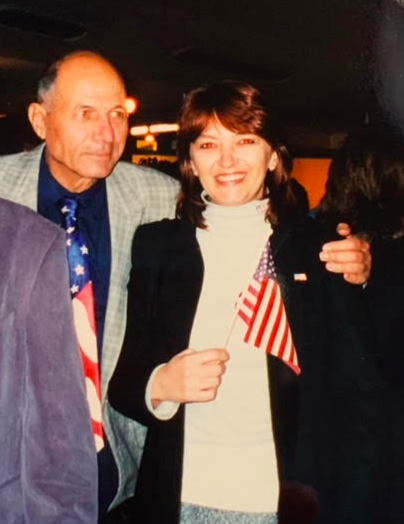Mihaela Boboc: An Immigrant Story

Mihaela Boboc and her father at her naturalization ceremony
June 4, 2021
This story is about my mom. She always taught me to respect other countries and cultures. Growing up in Texas, I was in school with the sons and daughters of immigrants from Africa, South America, and, mainly, Central American countries off the southern border. The United States’ attitude towards immigrants has increasingly dehumanized immigrants–just like my mother. People often forget that immigrants are people, which is why I wanted to write this article. I wanted to push forward the message that respecting immigrants is respecting humans, and listening to their experiences is just as important as fighting for their rights. –Julia Boboc
“I remember how it was at the beginning, you feel very lonely for a long time,” Mihaela Boboc said, with tears in her eyes, of her first years in the US. “As much as people try to help, you don’t have those deep relationships that you had in the country that you left behind.”
At 29, Boboc immigrated with her husband from Romania to the US in 1996. She was one of the 20,000 chosen across the world to receive a permanent visa to the United States from a program called Diversity Visa.
“We didn’t think ahead that we would win it. We just wanted to have a chance,” she said. “We didn’t even think for a second that we would be the lucky whatever percentage that is.”
Not only did Boboc admit to not thinking through her application for a visa, she also admitted that she didn’t know that much about the United States as a whole. “All we knew about the United States was from Hollywood movies and TV shows,” she said. “I remember saying that I won’t believe that this place really exists until I see it with my own eyes.”
Boboc’s lack of familiarity with the United States was not unusual seeing as when she was growing up, Romania was an extremely isolated communist country. At the time of Boboc’s immigration, Romania had only just begun repairing its economy and society after a gruesome 42 year dictatorship.
“The economic situation in Romania at the time was difficult for young people. We were highly educated, but we were making a very low income and could barely afford groceries from month to month. It was a difficult time, and we felt like with what we have to offer, we can have a better chance elsewhere.”
Boboc and her husband were certain that they could find that better chance in the U.S. “America was like the promised land, just like it is for so many people, and it’s been forever,” she said. “It’s a place where if you work hard, and you give it all, you can make it, and I still do believe in the American dream.”
Boboc started to see how the U.S.’ positive image was shifting when she moved to Spain in 2015, where she heard people talking about America in a more negative tone.
“This is a country that used to lead the world, in my opinion,” she said. “It used to be the country that would be at the forefront of every civic, environmental, human rights issue.” But after living in the U.S. for 24 years, Boboc is starting to see the flaws in the so-called promised land as well. “I feel like we’re straying from what this country is supposed to represent in the world.”
When this interview took place in 2020, Boboc was disheartened by the stances the leadership in the U.S. at that time was taking on immigration and immigrants as a whole.
“What the government is doing blocking immigration right now, I find it disgraceful. Because this is what this country is made of.”
Boboc is also saddened by the treatment of immigrants today. “So many people look down upon our immigrants, as if they’re coming to take our jobs. We don’t tolerate their customs, we don’t tolerate their clothing if it’s different than ours. Anything that’s different.”
Boboc has realized how her own immigration story is different from that of immigrants coming to the U.S. today. She even doubts if she would have been able to enter the country today if she tried, especially with the bitter aftertaste of the Trump administration’s stance on immigrants.
“It’s unbearable for me to see legit people who have legit issues, and who are fleeing from situations that are life threatening or dignity threatening,” Boboc said. “And the fact that we don’t allow them even the slightest chance, and we have them go back or wait somewhere else, it’s just unbearable.”
Boboc is grateful today for how easy her incorporation into life in the U.S. was. “My immigration experience was extraordinary. I was able to get a job right away. I was able to get my citizenship within five years. I was completely welcomed in society and not looked at as an outsider at all. I was assimilated in my workplace very fast.”
Boboc believes that she was granted the best opportunities, due mostly to the fact that she moved here in the 90s under an administration that wasn’t as critical of immigration. She remembers the day she became a citizen: “That room where we pledged our allegiance to the flag was full of people from all over the world, all different colors.”
After reflecting on her incredible journey, Boboc ends on an unapologetic and hopeful note. “I don’t regret coming here. I don’t regret living here, and I hope you young ones can appreciate this place for what it is and what it will be again.”


